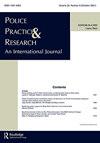治理差距:审查警察服务委员会在加拿大对警察服务负责的能力
IF 1.8
Q2 CRIMINOLOGY & PENOLOGY
引用次数: 0
摘要
摘要:在“解散警察”和“黑人的命也是命”(BLM)运动之后,警察的问责制和合法性引起了人们的广泛关注。重要的是,人们提出了关于如何有效地治理和管理警务的问题,特别是在警察暴力和不当行为方面。虽然大部分讨论都集中在警察的行动上,但很少有研究审查负责追究警察责任的民间机构:警察服务委员会(psb)。近年来,一些备受瞩目的公开报告指出,加拿大的某些公共服务银行正在努力履行自己的角色和责任,并提出了许多建议,以解决现有的不足之处。这些详细的报告对监督和治理具有重要意义。但是,对这些报告中提出的关切作出的反应的规模和普遍性仍然未知。在本研究中,我们探讨了公安机关成员的能力和培训问题,以更好地了解公安机关提供有意义的警察治理的期望与他们的感知能力之间的差距。我们的研究表明,治理方面存在重大差距,这与全国各地的公共服务银行缺乏足够的培训和能力建设有关。讨论了建议和未来的发展方向。关键词:警察监督警察治理警察服务委员会紧张和能力加拿大披露声明作者未报告潜在的利益冲突。在某些省份,用“Commission”代替“board”,指的是同一个管理机构。尽管存在这种区别,但许多公共服务机构经常难以确定业务和政策之间的界限(Caul, Citation2009;罗奇,Citation2022)。我们认为,这直接关系到公共服务机构角色的培训问题。会议在萨斯喀彻温省的萨斯卡通举行,因此这可能增加了萨斯喀彻温省psb的参与,并导致该省的代表率更高。安大略是安大略省人口最密集的省份,拥有最多的警察服务,因此它占了大约三分之一的参与者。这里的代码代表受访者(I)或讨论者(D)号码,以及他们的省份(例如SK是萨斯喀彻温省)。加上- FN指的是某一特定省份内的第一民族服务。本研究得到了社会科学与人文研究理事会[892-2022-0021]的支持。作者简介tarah Hodgkinson博士是威尔弗里德劳里埃大学犯罪学系的助理教授。她的研究议程广泛涉及社区安全,特别关注警务和警察监督、预防犯罪和空间犯罪学。图里奥·卡普托,博士,卡尔顿大学社会与人类学系兼职研究教授。他也是加拿大警察学院(Canadian Police College)任职时间最长的主题专家。他的研究重点是警务、战略规划、警察绩效评估、警务监督和警察领导。Natasha Martino,文学硕士,麦克马斯特大学社会学系博士生。她的研究考察了无家可归者的法律执行、警察监督和治理以及第三方警务。本文章由计算机程序翻译,如有差异,请以英文原文为准。
The governance gap: examining the capacity of police service boards to hold police services accountable in Canada
ABSTRACTIn the wake of the Defund the Police and the Black Lives Matter (BLM) movements, police accountability and legitimacy are commanding a significant amount of attention. Importantly, questions are being raised about how to effectively govern and manage policing especially with respect to police violence and misconduct. While much of this discussion has focused on the actions of the police, there has been little research examining the civilian bodies responsible for holding police accountable: Police Service Boards (PSBs). In recent years, a few high-profile public reports have identified that certain PSBs in Canada, are struggling to carry out their roles and responsibilities and offered numerous recommendations to address existing shortcomings. These detailed reports have important implications for oversight and governance. However, the scale and generalizability of the response to the concerns raised in these reports remains unknown. In this study, we explore issues of capacity and training for PSB members to better understand the gap between the expectations of PSBs to provide meaningful governance of the police and their perceived capacity to do so. Our research suggests that a significant gap in governance exists, related to the lack of adequate training and capacity building in PSBs across the country. Recommendations and future directions are discussed.KEYWORDS: Police oversightpolice governancepolice service boardstraining and capacityCanada Disclosure statementNo potential conflict of interest was reported by the author(s).Notes1. ‘Commission’ is used instead of ‘board’ in some provinces and refers to the same governing body.2. Despite this distinction, many PSBs often struggle to determine the line between operations and policy (Caul, Citation2009; Roach, Citation2022). We would argue this relates directly to the issue of training on PSB roles.3. The conference took place in Saskatoon Saskatchewan, so this likely increased participation from the Saskatchewan PSBs and led to a higher representation for this province.4. Ontario is the most densely populated province in Ontario, with the largest number of police service, hence why it accounts for approximately 1/3 of participants here.5. The codes here represent the interviewee (I) or discussant (D) number, and their province (ex. SK is Saskatchewan). An addition of – FN refers to a First Nations Service within a particular province.Additional informationFundingThis work was supported by the Social Sciences and Humanities Research Council [892-2022-0021].Notes on contributorsTarah HodgkinsonTarah Hodgkinson, PhD, is an assistant professor in the department of Criminology at Wilfrid Laurier University. Her research agenda broadly addresses community safety, with a specific focus on policing and police oversight, crime prevention, and spatial criminology.Tullio CaputoTullio Caputo, PhD, is an adjunct research professor in the department of Sociology and Anthropology at Carleton University. He is also the longest running subject matter expert for the Canadian Police College. His research agenda focuses on policing, strategic planning, police performance assessment, policing oversight, and police leadership.Natasha MartinoNatasha Martino, MA, is a PhD Student in the department of Sociology at McMaster University. Her research examines by-law enforcement of homelessness, police oversight and governance, and third-party policing.
求助全文
通过发布文献求助,成功后即可免费获取论文全文。
去求助
来源期刊

Police Practice and Research
CRIMINOLOGY & PENOLOGY-
CiteScore
4.10
自引率
5.60%
发文量
50
期刊介绍:
Police Practice and Research is a peer-reviewed journal that presents current and innovative police research as well as operational and administrative practices from around the world. Articles and reports are sought from practitioners, researchers and others interested in developments in policing, analysis of public order, and the state of safety as it affects the quality of life everywhere. Police Practice and Research seeks to bridge the gap in knowledge that exists regarding who the police are, what they do, and how they maintain order, administer laws, and serve their communities. Attention will also be focused on specific organizational information about the police in different countries or regions. There will be periodic special issues devoted to a particular country or continent.
 求助内容:
求助内容: 应助结果提醒方式:
应助结果提醒方式:


